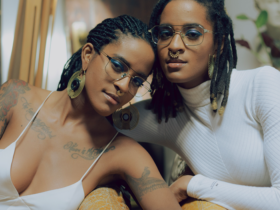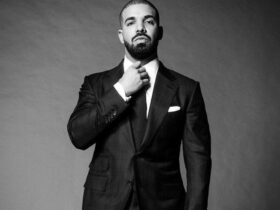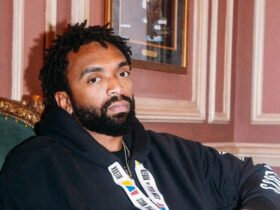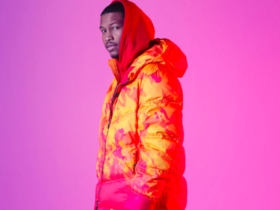Iconic brands that stand the test of time all share one distinct characteristic: seamless positioning. A successful brand is one that identifies a niche population of consumers, serves them a product they can’t get elsewhere, and creates a buyer experience that remains unique. We’ve seen examples of this in companies like Adidas that grew from a sports apparel product to a lifestyle brand seated at the intersection of pop cultural progression leading creative workshops and selling apparel at the same time. The way Apple evolved from a progressive tech product to a lifestyle enhancement tool effortlessly integrated into our everyday lives is the stuff of legends. Regardless of what they’re selling, monumental brands understand the art of allowing consumers to not only witness company growth, but to be a part of it.
In today’s new pop cultural economy we see public figures going further than grabbing brand endorsements. They’re turning themselves into larger than life institutions that quite literally reshape industries, and create new standards for success. If there’s one name that stands out on the list that includes Jay-Z, Drake, Beyonce, LeBron James, and more – it’s most definitely Rihanna. Over the last decade, she has seamlessly transitioned her brand from burgeoning pop princess to a fashion and beauty empire sitting amongst the ranks of the most prestigious brands in modern culture. That transition required 3 key product development and marketing practices that redefined her image, and made it evergreen while capitalizing on opportunities in the marketplace that would solidify longevity.
Creating An Evergreen Brand Ethos
When we think about the term evergreen, we typically think about content that remains relevant. In the case of Rihanna, the concept of evergreen applies to her overall image and brand ethos. She owned her sexuality unapologetically. She owned her business, and demanded respect in her field of work. Rihanna embodied the image of the new age woman who refuses the confines of societal standards. Globally, from 2015 to 2016, women entrepreneurship rates increased by double that of their male counterparts. In the United States where women own 11.3 million businesses, it is estimated that 36% of all businesses are owned by women, an increase of six percent from 2007. According to Nielsen, the number of businesses majority-owned by Black women grew 67% between 2007 and 2012. In 2018, there were over 114% more women entrepreneurs than 20 years ago. By establishing a brand identity rooted in the cultural shift projected to keep growing amongst her core millennial demographic, she’s made herself a resonating brand for years to come.
Filling Customer Gaps
Black women make up 14% of all U.S. women, yet they set the trends and drive mainstream revenue. A reported 63% of black women agreed that they were willing to purchase high quality items, but oddly enough they were left out of marketing campaigns and not considered in product development. Specifically in the fashion & beauty industry, makeup and apparel brands failed to offer enough shades or clothing sizes to include the many colors and shapes of the most influential demographic. Enter Rihanna, who created a product for a highly profitable yet underserved demographic. She dove into the market offering 40 shades of foundation, literally redefining the industry standard as Maybelline, Covergirl, Revlon, and more rushed to copy the approach dubbed by outlets as the “Fenty Effect”. An effect that has Fenty beauty at close to a valuation of nearly a billion dollars. As far as luxury fashion, curvy women are typically left out altogether. A strange issue to have being that 68% of women are a size 14 and up. Fenty clothing filled yet another gap in the market by offering up to a size 14 with plans to expand further, genius considering that plus size apparel makes up just 0.1% of the luxury market.
Culturally & Socially Conscious Marketing
Offering a stellar product is only half of the battle for any brand. If marketing efforts are off target it’s easy to fail at connecting with potential consumers. In a time where social and cultural consciousness is of most importance to consumers, Fenty honed in on inclusivity and won big. With Fenty, no woman is made to feel like she’s left out. They can all see themselves in the models endorsing the product, and the Instagram feed portraying the lifestyle. In a well-timed launch, Fenty put inclusivity at the forefront during New York Fashion Week. Most notably, the brand is authentic in its offering and messaging. During a time where consumers can see through the smoke of targeted ads and brands literally buying their attention, Fenty created a buzz based off of conversation. Conversation is the most important metric in marketing, because it’s the only one that can’t be bought.
Rihanna and her team’s execution is something to be studied. They have successfully positioned her as one of the most influential and innovative minds in the world. It’s beyond music, she is a walking enterprise. She’s not just a brand, she’s an institution. She serves a market that spends the most and until now was almost completely ignored. That’s the type of business acumen that allows Rihanna to integrate vertically into a powerful conglomerate like LVMH, providing product for generations to come. That Rihanna Reign isn’t letting up anytime soon.
Original article written by Dev T. Smith for Adweek






Recent Comments